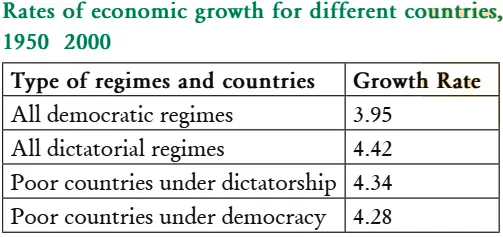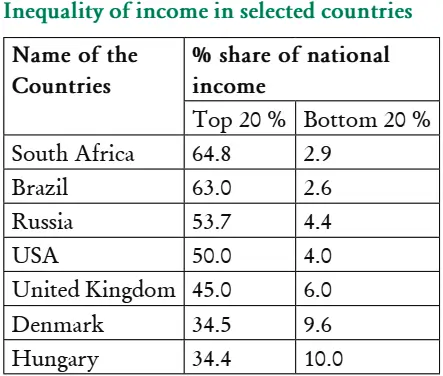Revision Notes for Class 10 Political Science – Chapter 5 Outcomes of Democracy
Are you confused on Revision Notes? Revision Notes for class 10 Political Science – Chapter 5 Outcomes of Democracy is the right place to refer.
Democracy has some expected and actual outcomes of democracy in various respects such as quality of government, economic well-being, inequality, social differences and conflict and finally freedom and dignity.
Democracy: A better form of Government
Following characteristics of the Democracy makes it a better form of a Government:
- It promotes equality among citizens.
- It enhances the dignity of the individuals.
- It improves the quality of decision making.
- It provides a method to resolve conflicts.
- It allows room to correct mistakes.
Ideals of the Democracy
Accountable, Responsive, and Legitimate Government:
Democracy should produce a government that is accountable to the citizens, and responsive to the needs and expectations of the citizens.
- Democracy is concerned with ensuring that People will have the right to choose and control their rulers.
- Whenever possible and necessary, Citizens should be able to participate in decision making, that affects them all.
- It follows the laid procedures.
- A Citizen can know if a decision was taken through the correct procedures. One has the right and the means to examine the process of decision making.
- It develops mechanisms for citizens to hold the government accountable and mechanisms for citizens to take part in decision making whenever they think fit.
- Democracies have had greater success in setting up regular and free elections and in setting up conditions for open public debate.
Economic growth and development
If democracies are expected to produce Good Governments, then is it fair to expect that they would also produce development.
- Factors affecting economic development: Country’s population size, global situation, cooperation from other countries, economic priorities adopted by the country, etc.
- The difference in the rates of economic development between less developed countries with dictatorships and democracies is negligible. Democracy is expected not to lag behind dictatorships in this respect.
Reduction of inequality and poverty
Perhaps more than development, it is reasonable to expect democracies to reduce economic disparities.
- Political equality: All individuals have equal weight in electing representatives.
- Reducing Economic inequalities: The poor constitute a large proportion of voters and no party would like to lose their votes. Yet democratically elected governments do not appear to be as keen to address the question of poverty. However, a good Democracy must deal with such issues.
Accommodation of Social diversity
Democracy should produce a harmonious social life.
- Accommodate Social divisions: Democracies usually develop a procedure to conduct their competition. This reduces the possibility of these tensions becoming explosive or violent.
- Handle Conflicts: Democracy has ability to handle social differences, divisions and conflicts. Nondemocratic regimes often turn a blind eye to or suppress internal social differences. A democracy must fulfil two conditions in order to achieve this outcome:
- The majority always needs to work with the minority so that Government functions to represent the general view.
- In terms of religion or race or linguistic group, Rule by majority means that in case of every decision or in case of every election, different persons and groups may and can form a majority.
Dignity and Freedom of the Individuals
Democracy stands much superior to any other form of government in promoting the Dignity and Freedom of the Individuals.
- The passion for respect and freedom are the basis of democracy. Democracies throughout the world have recognised this, at least in principle, and it has been achieved in various degrees in various democracies.
- For Societies which have been built for long on the basis of subordination and domination, it is not a simple matter to recognize that all individuals are equal. For instance, the Democracy in India has strengthened the claims of the disadvantaged and discriminated castes for equal status and equal opportunity.
Success of the Democracy
People have developed awareness and the ability to expect and to look critically at Power holders. A Public expression of dissatisfaction with democracy shows the success of the democratic project. It transforms people from the status of a Subject into that of a Citizen.
Interesting points
- Economic outcomes of Dictatorial regimes and Democracy:
- Dictatorial regimes: On an average, the dictatorial regimes have had a slightly better record of economic growth.
- Democratic regimes: Within democracies there can be very high degree of inequalities. In Democratic countries like South Africa and Brazil, the top 20 per cent people take away more than 60 per cent of the national income, leaving less than 3 per cent for the bottom 20 per cent population.




